Greek mythology, an intricate tapestry of tales and legends, provides an invaluable window into the beliefs, values, and societal norms of ancient Greece. More than just stories, these myths reflect the intellectual and cultural heartbeat of a civilization that laid the foundation for much of Western thought. They offer insights into the psyche of a people trying to understand the world around them, encapsulating their fears, hopes, aspirations, and moral dilemmas.
Apollo, one of the most revered deities of this pantheon, stands as a testament to the multifaceted nature of Greek divinity. Often depicted with a golden lyre and the radiant sun crowning his head, Apollo ruled over a diverse range of domains — from music and arts to prophecy and healing. His significance transcends mere tales; Apollo embodies the Greek ideals of balance, harmony, and enlightenment. Through him, one can glimpse the aspirations of a society striving for order in a chaotic world and the perpetual human quest for knowledge and understanding. As we delve deeper into the life and tales of Apollo, we unearth not just the stories of a god, but the very essence of ancient Greek civilization itself.
| Origin | Greek Mythology |
|---|---|
| Classification | God |
| Family Members | Zeus (Father), Leto (Mother), Artemis (Twin Sister) |
| Region | Greece |
| Associated with | Music, Prophecy, Healing, Sun, Light, Poetry, Arts |
I. Apollo’s Birth and Early Life:
The tale of Apollo’s birth is as tumultuous as it is illuminating. Born to the mighty Zeus, the king of the Greek pantheon, and the Titaness Leto, Apollo’s entry into the world was marked by both divine joy and intense adversity. His birth was not just a celestial event; it encapsulated the ever-present themes of love, jealousy, and perseverance prevalent in Greek mythology.
Birth:
Zeus, known for his numerous dalliances, fathered many gods and mortals. However, his union with Leto was unique. Not only did it produce the radiant Apollo, but also his twin sister, Artemis, the fiercely independent goddess of the hunt. But these births were anything but ordinary. Hera, Zeus’s wife, consumed by jealousy over her husband’s infidelity, forbade Leto from giving birth on any terra-firma — be it mainland or island. This decree posed a formidable challenge. Yet, with resilience characteristic of divine heroines, Leto found solace on the floating island of Delos. Anchored by the Aegean Sea’s gentle waves, Delos offered refuge, and it was here that she brought forth Apollo and Artemis, under a palm tree, amidst olive groves. Delos, once obscure, was forever immortalized as the birthplace of these divine twins.
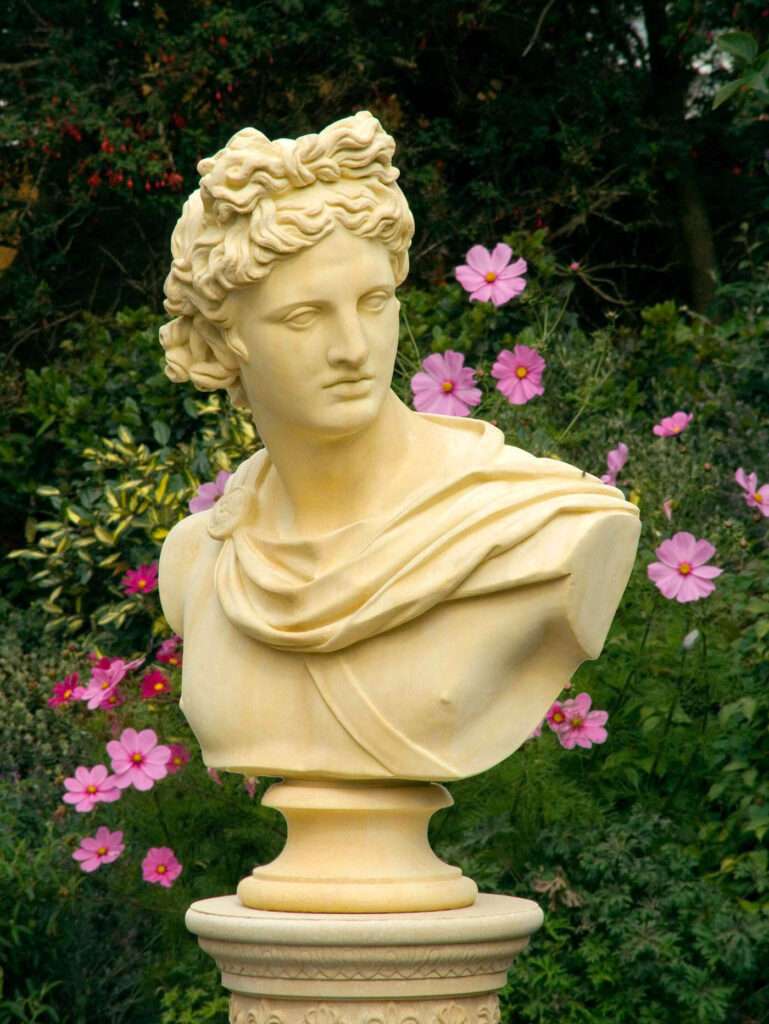
Childhood & Growth:
Even as an infant, Apollo exhibited attributes befitting a god. One of his earliest feats was the slaying of Python, a malevolent serpent that terrorized the inhabitants of Delphi. Python was not just an ordinary beast; it was a symbol of chaos and old prophetic cults that stood contrary to the new order Apollo represented. With a barrage of golden arrows, young Apollo vanquished the serpent, reestablishing order and, in doing so, marking his territory in the sacred world. Following this triumphant act, Apollo declared Delphi his sanctuary. It wasn’t just a territorial claim; Delphi became the epicenter of Apollonian worship. As the patron god of this sanctuary, Apollo oversaw the famed Oracle of Delphi, where mortals and kings alike sought divine guidance, hoping to hear whispers of the future from the god of prophecy himself.
II. Apollo’s Multifaceted Domains:
Apollo, with his golden locks and piercing gaze, was not just a symbol of physical beauty, but also of intellectual and spiritual enlightenment. His domains were vast and varied, each shedding light on a different facet of ancient Greek life and its intrinsic values.
God of Music:
One cannot discuss Apollo without mentioning his profound connection with music. The Lyre, a stringed musical instrument, is often considered synonymous with Apollo. Crafted by the cunning god Hermes as a gesture of reconciliation after a minor tiff between the two, the Lyre became Apollo’s cherished possession. More than just a musical tool, the Lyre symbolized harmony, balance, and the celestial order of things — principles that Apollo personified. Under his deft fingers, the strings produced melodies that could soothe savage beasts and even halt the very rivers in their flow.
Furthermore, Apollo’s relationship with the Muses — the nine goddesses of arts and sciences — further solidified his status as the beacon of artistic inspiration. Serving as their leader, he guided them in their pursuits, ensuring that the arts flourished, and creativity knew no bounds in ancient Greece.
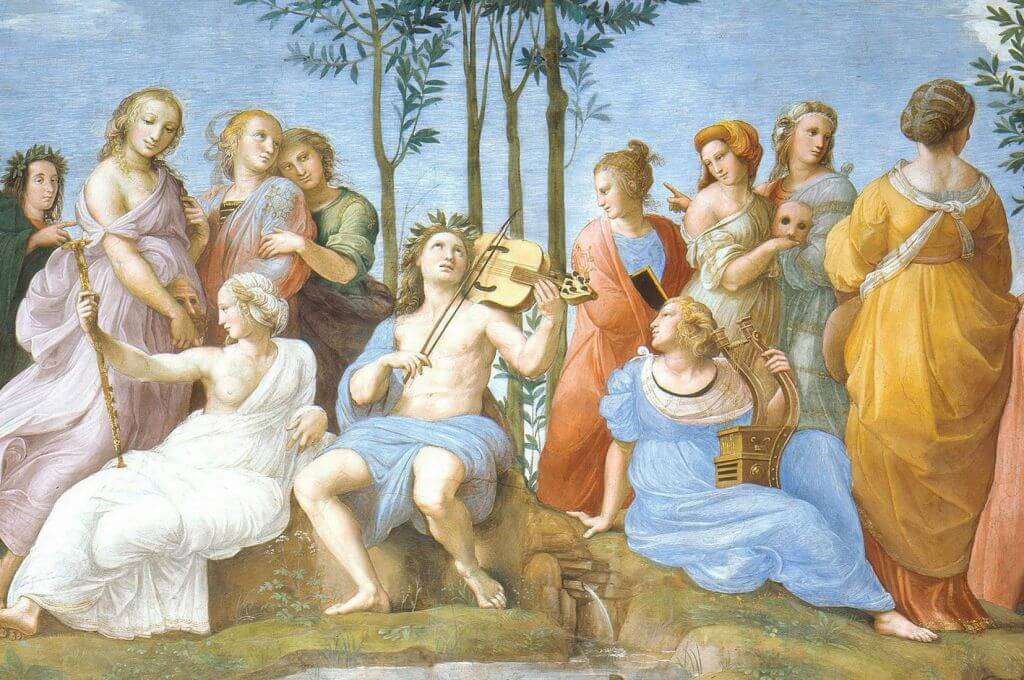
God of Prophecy:
If music showcased Apollo’s artistic side, prophecy was a testament to his intellectual prowess. The Oracle of Delphi, nestled amidst the rocky slopes of Mount Parnassus, was Apollo’s prophetic hub. Here, the Pythia, his high priestess, channeled the god’s visions, uttering cryptic messages that often decided the fate of cities and kings. From decisions of warfare to complex moral dilemmas, the Oracle’s prophecies were instrumental in shaping the trajectory of Greek society.
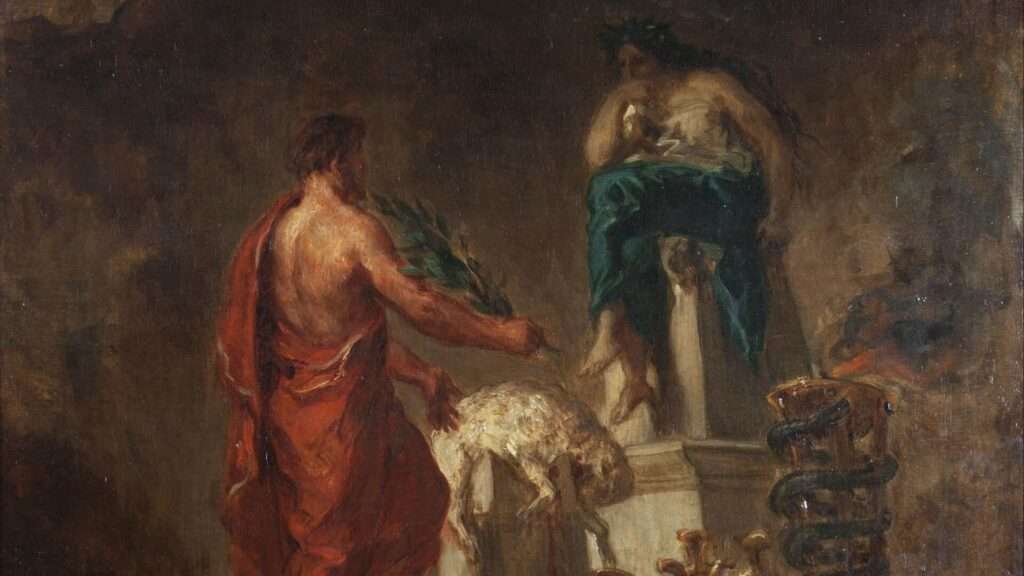
God of Healing and Plague:
Apollo’s power was a double-edged sword. On one hand, he was the god of healing, overseeing medicine and health rituals. Temples dedicated to him often doubled up as healing centers, where the sick sought solace. Apollo’s association with his son, Asclepius — the god of medicine — further emphasized his role in the therapeutic arts.
Yet, this same god, when angered, could unleash deadly plagues. This dichotomy reflected the ancient Greek understanding of life: that light and dark, health and sickness, often come from the same source.
God of Sun and Light:
While Helios was the Titan god who drove the sun chariot across the sky, Apollo was often associated with the sun’s life-giving and enlightening properties. He was the metaphorical light that drove away ignorance, illuminating minds and fostering wisdom. Beyond just the physical realm, Apollo’s solar association was a testament to his role in intellectual and spiritual enlightenment, guiding individuals in their quest for knowledge and truth.
III. Apollo’s Noteworthy Myths and Legends:
Apollo’s rich tapestry of myths and stories speaks volumes about the diverse and often contradictory nature of human emotions and experiences. They oscillate between love and tragedy, camaraderie and rivalry, justice and reward, encapsulating the essence of Greek mythology’s complex moral universe.
Love and Tragedies:
- Tale of Daphne:
One of the most poignant tales associated with Apollo is his ill-fated love for the nymph, Daphne. Pursued relentlessly by an infatuated Apollo, Daphne sought to escape his advances. As her pleas for rescue reached her father, the river god Peneus, she was transformed into a laurel tree. Apollo, in his despair, declared the laurel as his sacred tree, its leaves symbolizing both his love and his loss. - Tragic Love Story with Hyacinthus:
Yet another heartrending tale revolves around Apollo’s love for the beautiful youth, Hyacinthus. Their bond, however, met a tragic end during a game of discus. A throw from Apollo, redirected by a jealous Zephyr (the west wind), struck Hyacinthus, leading to his untimely death. From his spilled blood arose the hyacinth flower, forever commemorating Apollo’s profound grief.
Feuds and Friendships:
- Competition with Marsyas:
Apollo’s divine talents were often challenged, as in the case of Marsyas, a satyr, who boasted of his superior flute-playing skills. A musical contest ensued, with the Muses as judges. Upon his inevitable victory, Apollo meted out a harsh punishment to Marsyas, flaying him for his hubris. This tale underscores the dangers of overconfidence when juxtaposed against divine prowess. - Brotherhood Bond with Hermes:
However, not all of Apollo’s interactions were marked by rivalry. His relationship with Hermes, the messenger god, is one of camaraderie and brotherhood. Born from an initial conflict over the theft of Apollo’s cattle, their bond solidified when Hermes gifted Apollo the Lyre, laying the foundation for a lasting friendship.
Punishments and Rewards:
- The Punishment of Niobe:
Niobe, a queen of Thebes, boasted of her fourteen children, deeming herself superior to Leto, who had only two. Enraged, Apollo and Artemis, in defense of their mother’s honor, slew Niobe’s children. This tale serves as a stern reminder of the perils of hubris and the reverence owed to the gods. - Rewards to those who honored him:
While he was swift in meting out justice, Apollo was equally generous in rewarding devotion. Temples erected in his name, hymns sung in his praise, and rituals conducted to seek his blessings were often met with divine favors, ensuring prosperity, health, and wisdom for his devotees.
IV. Apollo’s Influence in Arts and Real-Life:
Throughout the annals of history, the profound influence of Apollo permeated both the realms of art and the intricate fabric of day-to-day life. His omnipresence echoes not just in ancient relics but also in the very ethos of societies, shaping cultural narratives and guiding critical decisions.
Cultural Impact:
- His Role in Ancient Poems, Plays, and Sculptures:
Apollo, with his divine lyre and impeccable form, became a muse for countless poets, playwrights, and sculptors of antiquity. Ancient epics extolled his feats, tragedies delved into his complex relationships, and comedies occasionally showcased his lighter side. Sculptures from the classical era often depicted Apollo in his youthful vigor, exemplifying the Greek ideal of physical perfection. The famed statue of ‘Apollo Belvedere’ stands testament to this admiration, immortalizing him in flawless marble.
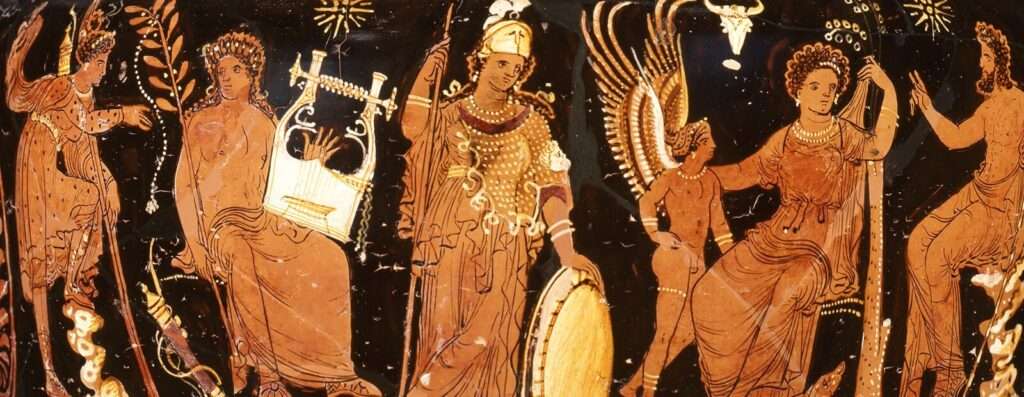
- Influence on the Renaissance and Beyond:
The Renaissance, characterized by a revival of classical knowledge, saw a resurgence in Apollonian motifs. Painters, sculptors, and writers drew inspiration from his myths, reinterpreting them in the light of contemporary sensibilities. His form adorned chapels, his tales were retold in operas, and his values found resonance in philosophical discourses. From Botticelli’s paintings to Handel’s operas, Apollo’s presence was undeniable.
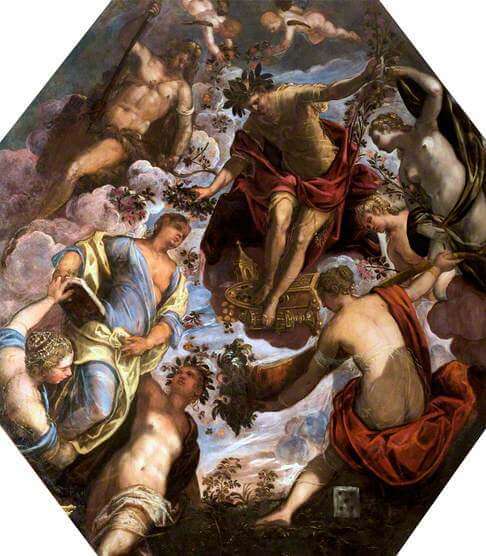
Real-life Decisions and Impacts:
- How Ancient Cities, Leaders, and Individuals Sought His Guidance:
Apollo, as the god of prophecy, held immense sway over the critical decisions of cities, leaders, and common folk. Leaders would dispatch emissaries to Delphi, seeking the Oracle’s wisdom before embarking on campaigns or forging alliances. Cities often invoked his blessings during foundational ceremonies, hoping for prosperity under his watchful gaze. Even individuals, at crossroads in their lives, would journey to his temples, praying for clarity and direction. - Implication for Critical Decisions in War, Leadership, and Personal Life:
The Oracle’s prophecies, while cryptic, were deemed sacrosanct. A favorable prophecy could embolden an army, ensuring morale remained high, while an unfavorable one might lead to retractions or alterations in strategy. Leaders often based their legitimacy on Apollo’s perceived endorsement, consolidating power and ensuring loyalty. On a personal front, his guidance influenced marriages, vocations, and even relocation decisions, making Apollo an integral part of the ancient Greek decision-making fabric.
V. Legacy of Apollo:
The sands of time, while eroding many legacies, have only fortified Apollo’s imprint on history and contemporary culture. From colossal temples that once echoed with hymns of praise to modern-day references that subtly nod to his grandeur, Apollo’s legacy is both vast and enduring.
Temples and Places of Worship:
- Focus on Delphi and its Archaeological Significance:
Delphi, often termed the ‘Navel of the World’, was Apollo’s most significant sanctuary. Perched amidst the Phocian mountains, this sacred site was home to the revered Oracle of Delphi. Pilgrims, from near and far, would traverse treacherous terrains to consult the Pythia and seek Apollo’s guidance. The archaeological remnants of Delphi, with its temple ruins, theater, and stadium, provide a vivid snapshot of its past grandeur. More than just bricks and stones, Delphi serves as a testament to Apollo’s central role in Greek religious and political life. - Other Key Temples Dedicated to Him:
While Delphi was undoubtedly the epicenter of Apollonian worship, his reverence spread far and wide. Temples in his honor dotted the Greek landscape, from the sun-kissed coasts of Corinth to the bustling hub of Athens. These temples, beyond being places of worship, were centers of art, music, and learning – encapsulating Apollo’s multifaceted domains.
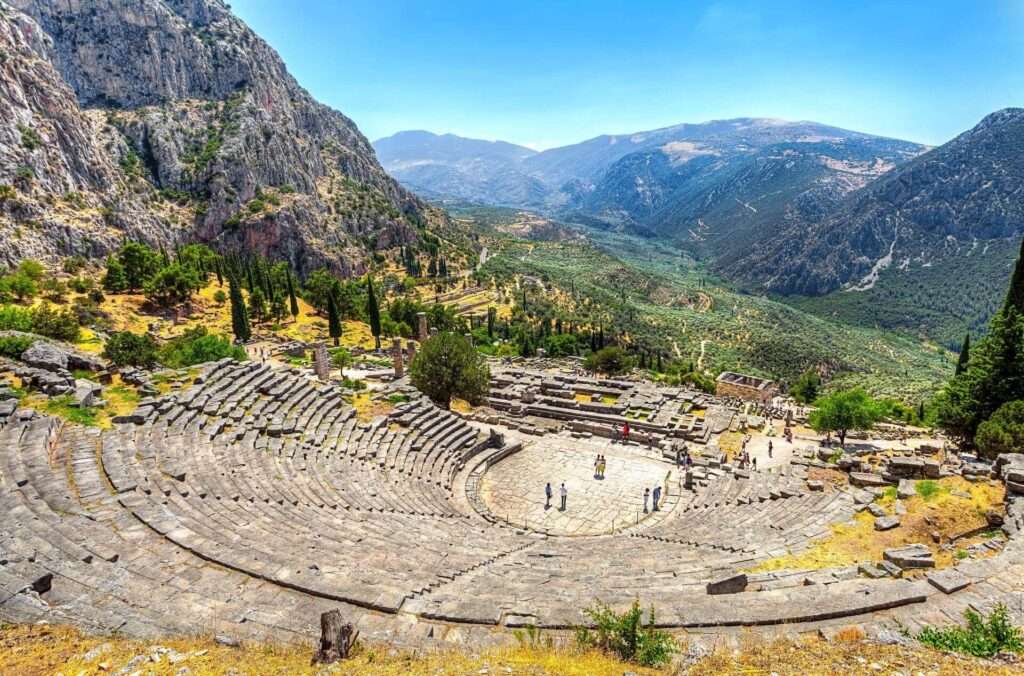
Modern-day References and Influence:
- Apollo’s Influence on Contemporary Music, Literature, and Culture:
The echoes of Apollo can be discerned in contemporary art forms. Musicians often invoke his name as a symbol of pure, unadulterated artistry. Writers, inspired by his myths, weave narratives that explore themes of love, tragedy, and enlightenment. Even in popular culture, Apollo’s motifs are prevalent, with films, series, and art installations drawing from his rich tapestry of tales. - Significance in Science – Naming of Space Missions, etc.:
Perhaps the most telling testament to Apollo’s enduring influence is the homage paid to him in the realm of science. The ‘Apollo’ space program, helmed by NASA in the 1960s and 70s, aimed to land humans on the moon and bring them safely back to Earth. The choice of name was no accident. Just as Apollo, with his sun chariot, bridged the heavens and Earth, these missions sought to transcend earthly boundaries, reaching out to the vast cosmos.

VI. Conclusion:
In the vast pantheon of Greek deities, Apollo holds a special place, not merely as a god of multifarious domains but as an embodiment of ideals that resonate across ages. His tales, while rooted in ancient Greece, are timeless in their exploration of love, tragedy, aspiration, and enlightenment.
The undying legacy of Apollo is evident in the remnants of grand temples that once echoed with hymns of reverence, and in modern tributes that span literature, music, and even space exploration. He is not just a figure of the past but a continued source of inspiration. Whether it’s in the haunting notes of a lyre, the cryptic prophecies of an oracle, or the audacious aspirations of space missions, Apollo’s influence is palpable.
His diverse domains—music, prophecy, healing, and enlightenment—are not mere tales of divine prowess but reflections of universal human quests. They encapsulate our yearning for harmony in chaos, clarity amidst uncertainty, and knowledge in the face of the unknown. And therein lies Apollo’s eternal allure.
As we traverse the corridors of history and navigate the complexities of the present, Apollo serves as a reminder of our ceaseless pursuit of balance, wisdom, and beauty. In celebrating him, we don’t just honor a Greek god but recognize and revere the timeless values and aspirations he represents. For as long as humanity cherishes these ideals, Apollo’s legacy will remain unblemished, shining brightly, guiding us like the sun that he so magnificently personifies.
